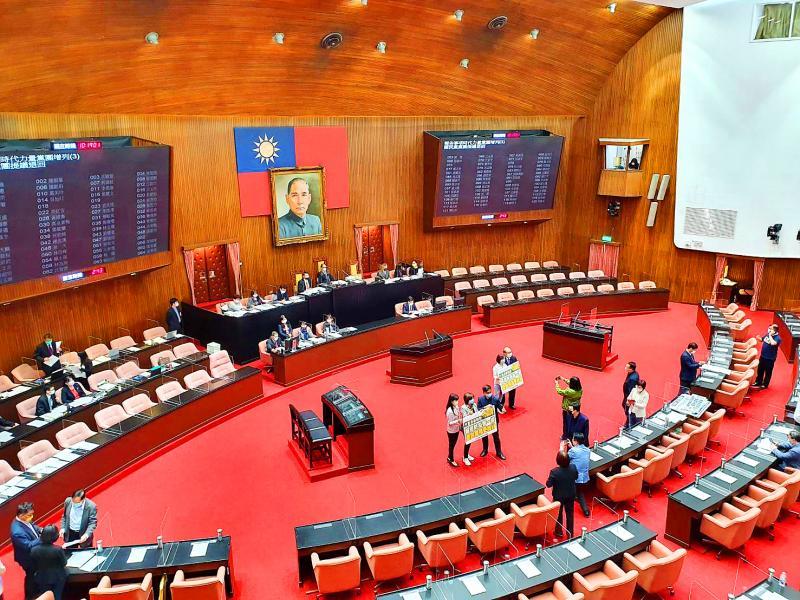President William Lai (賴清德) yesterday promulgated amended legislation that tightens requirements for petitions used to initiate the recall of elected officials, after the Legislative Yuan upheld the bill following a revote requested by the Cabinet last week.
Per Taiwanese law, the amendments is to take effect three days after the promulgation.

Photo: Hsieh Chun-lin, Taipei Times
With the promulgation of the amendments to the Public Officials Election and Recall Act (公職人員選舉罷免法) passed in December last year, Democratic Progressive Party (DPP) caucus secretary-general Wu Szu-yao (吳思瑤) said the party would follow the Constitution to seek a remedy.
The DPP government is preparing to petition the Constitutional Court to rule on the constitutionality of the amended law, Wu added.
She did not explain how the government would seek such a ruling.
The newly amended Constitutional Court Procedure Act (憲法訴訟法) mandates that a minimum of 10 justices hear and rule on a case, with an unconstitutional ruling to be supported by at least nine justices.
Currently, the court has only eight Grand Justices, as the Legislative Yuan has declined to approve a new slate of judicial nominations presented by Lai in December.
The DPP government has argued that the amended recall act would "exceedingly restrict" the public's right to recall elected officials and "significantly increase the burden" of local electoral authorities.
The amendments to the act, proposed by Chinese Nationalist Party (KMT) lawmakers and backed by their counterparts from the smaller opposition Taiwan People's Party (TPP), were passed by a majority of lawmakers.
The newly amended law requires people initiating a recall petition and those who sign up to such an initiative to provide photocopies of their identification cards when submitting petition signatures.
In the past, campaigners only had to present the ID numbers and registered addresses of those endorsing a recall petition to local election commissions, a process critics argued has been abused.
The new law also includes punitive measures, stipulating that anyone found guilty of using someone else's identification or forging an ID for a recall petition may face up to five years in prison or a fine of up to NT$1 million (US$30,520).
After the revisions were passed by the Legislative Yuan on Dec. 20, the Cabinet requested the legislature revote on the amendments based on the provisions of the Constitution, saying it would be difficult to execute.
However, the Legislative Yuan voted on Tuesday last week to uphold the new legislation and sent the legislation to the Presidential Office a day later, paving the path to its promulgation by Lai yesterday.

The manufacture of the remaining 28 M1A2T Abrams tanks Taiwan purchased from the US has recently been completed, and they are expected to be delivered within the next one to two months, a source said yesterday. The Ministry of National Defense is arranging cargo ships to transport the tanks to Taiwan as soon as possible, said the source, who is familiar with the matter. The estimated arrival time ranges from late this month to early next month, the source said. The 28 Abrams tanks make up the third and final batch of a total of 108 tanks, valued at about NT$40.5 billion

Two Taiwanese prosecutors were questioned by Chinese security personnel at their hotel during a trip to China’s Henan Province this month, the Mainland Affairs Council (MAC) said yesterday. The officers had personal information on the prosecutors, including “when they were assigned to their posts, their work locations and job titles,” MAC Deputy Minister and spokesman Liang Wen-chieh (梁文傑) said. On top of asking about their agencies and positions, the officers also questioned the prosecutors about the Cross-Strait Joint Crime-Fighting and Judicial Mutual Assistance Agreement, a pact that serves as the framework for Taiwan-China cooperation on combating crime and providing judicial assistance, Liang

A group from the Taiwanese Designers in Australia association yesterday represented Taiwan at the Midsumma Pride March in Melbourne. The march, held in the St. Kilda suburb, is the city’s largest LGBTQIA+ parade and the flagship event of the annual Midsumma Festival. It attracted more than 45,000 spectators who supported the 400 groups and 10,000 marchers that participated this year, the association said. Taiwanese Designers said they organized a team to march for Taiwan this year, joining politicians, government agencies, professionals and community organizations in showing support for LGBTQIA+ people and diverse communities. As the first country in Asia to legalize same-sex

MOTIVES QUESTIONED The PLA considers Xi’s policies toward Taiwan to be driven by personal considerations rather than military assessment, the Epoch Times reports Chinese President Xi Jinping’s (習近平) latest purge of the Chinese People’s Liberation Army (PLA) leadership might have been prompted by the military’s opposition to plans of invading Taiwan, the Epoch Times said. The Chinese military opposes waging war against Taiwan by a large consensus, putting it at odds with Xi’s vision, the Falun Gong-affiliated daily said in a report on Thursday, citing anonymous sources with insight into the PLA’s inner workings. The opposition is not the opinion of a few generals, but a widely shared view among the PLA cadre, the Epoch Times cited them as saying. “Chinese forces know full well that